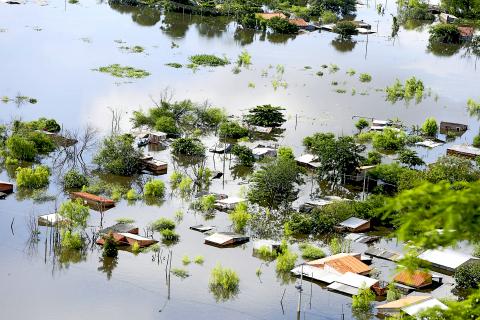More than 100,000 people have had to evacuate from their homes in the bordering areas of Paraguay, Uruguay, Brazil and Argentina due to severe flooding in the wake of heavy summer rains brought on by El Nino, authorities said on Saturday.
In the worst-affected country, Paraguay, about 90,000 people in the area around the capital city of Asuncion have been evacuated, the Asuncion Emergencies Office said.
Many are poor families living in precarious housing along the banks of the River Paraguay.

Photo: Reuters
The Paraguayan government has declared a state of emergency in Asuncion and seven regions of the country to free up funds to help those affected. Several people have been killed by trees falling in the storms that caused the flooding, local media reported. There was no official death toll yet.
In Alberdi, about 120km south of Asuncion, the government recommended that several thousand more people living along the banks of the River Paraguay evacuate.
“[The flooding] was directly influenced by the El Nino phenomenon which has intensified the frequency and intensity of rains,” the national Emergencies Office said.
This year’s El Nino, which sparks global climate extremes, is the worst in more than 15 years, the UN’s World Meteorological Organization (WMO) said last month.
“Severe droughts and devastating flooding being experienced throughout the tropics and sub-tropical zones bear the hallmarks of this El Nino, which is the strongest in more than 15 years,” WMO Secretary-General Michel Jarraud said in a statement.
Officials at Paraguay’s Emergencies Office said the river might rise even more in the coming days, stabilizing and falling back towards normal levels from next month onwards.
In northern Argentina, about 20,000 people have also had to abandon their homes, the government said on Saturday.
“We are going to have a few complicated months, the consequences will be serious,” Corrientes Province Governor Ricardo Colombi said after flying over the worst affected areas with Argentine Cabinet chief Marcos Pena.
Pena said national government aid was already on its way and Argentine President Mauricio Macri intended to make improving infrastructure a priority so that such flooding did not occur again.
“Argentina has a very big lack of infrastructure,” he said.
Macri was due to visit the flooded areas yesterday.
In Uruguay, more than 9,000 people have had to flee their homes, according to the Uruguayan Emergencies Office, which added that it expected water levels to remain at their current level for several days before subsiding.
At least four people have died in Argentina and Uruguay due to the storms and floods, according to local media reports.
One was reported to have drowned while another was electrocuted by a fallen power cable.
Brazilian President Dilma Rousseff also flew over the flooded areas on the border with Argentina and Uruguay on Saturday morning. Rio Grande do Sul state civil defense said 1,795 people were left homeless there after 38 towns were affected by heavy rains.

Right-wing political scientist Laura Fernandez on Sunday won Costa Rica’s presidential election by a landslide, after promising to crack down on rising violence linked to the cocaine trade. Fernandez’s nearest rival, economist Alvaro Ramos, conceded defeat as results showed the ruling party far exceeding the threshold of 40 percent needed to avoid a runoff. With 94 percent of polling stations counted, the political heir of outgoing Costa Rican President Rodrigo Chaves had captured 48.3 percent of the vote compared with Ramos’ 33.4 percent, the Supreme Electoral Tribunal said. As soon as the first results were announced, members of Fernandez’s Sovereign People’s Party

EMERGING FIELDS: The Chinese president said that the two countries would explore cooperation in green technology, the digital economy and artificial intelligence Chinese President Xi Jinping (習近平) yesterday called for an “equal and orderly multipolar world” in the face of “unilateral bullying,” in an apparent jab at the US. Xi was speaking during talks in Beijing with Uruguayan President Yamandu Orsi, the first South American leader to visit China since US special forces captured then-Venezuelan president Nicolas Maduro last month — an operation that Beijing condemned as a violation of sovereignty. Orsi follows a slew of leaders to have visited China seeking to boost ties with the world’s second-largest economy to hedge against US President Donald Trump’s increasingly unpredictable administration. “The international situation is fraught

MORE RESPONSIBILITY: Draftees would be expected to fight alongside professional soldiers, likely requiring the transformation of some training brigades into combat units The armed forces are to start incorporating new conscripts into combined arms brigades this year to enhance combat readiness, the Executive Yuan’s latest policy report said. The new policy would affect Taiwanese men entering the military for their compulsory service, which was extended to one year under reforms by then-president Tsai Ing-wen (蔡英文) in 2022. The conscripts would be trained to operate machine guns, uncrewed aerial vehicles, anti-tank guided missile launchers and Stinger air defense systems, the report said, adding that the basic training would be lengthened to eight weeks. After basic training, conscripts would be sorted into infantry battalions that would take

GROWING AMBITIONS: The scale and tempo of the operations show that the Strait has become the core theater for China to expand its security interests, the report said Chinese military aircraft incursions around Taiwan have surged nearly 15-fold over the past five years, according to a report released yesterday by the Democratic Progressive Party’s (DPP) Department of China Affairs. Sorties in the Taiwan Strait were previously irregular, totaling 380 in 2020, but have since evolved into routine operations, the report showed. “This demonstrates that the Taiwan Strait has become both the starting point and testing ground for Beijing’s expansionist ambitions,” it said. Driven by military expansionism, China is systematically pursuing actions aimed at altering the regional “status quo,” the department said, adding that Taiwan represents the most critical link in China’s